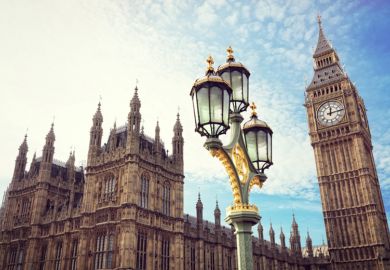It is widely accepted that UK universities are among best in the world because they are so autonomous. So the debates in the House of Lords on the Higher Education and Research Bill raise an important question: how is that autonomy best protected?
Is it by letting universities find their own position, leaving them to play to their strengths and respond nimbly to their own errors, while holding them publicly accountable on areas like financial management and positive student outcomes?
Or is it by writing a precise definition of what a university is into primary legislation for the first time, and then letting future governments – and the courts – interpret it as if they see fit?
It seems bizarre to me that so many peers who vehemently oppose the bill precisely because they think it eats into university autonomy have plumped for the latter option. On 9 January, by a margin of 248 to 221, the House of Lords defeated the government and inserted a new clause at the start of their proposed legislation defining what a university is.
It is important to note that none of the proposed wording is in any way objectionable. Here it is:
1 UK universities are autonomous institutions and must uphold the principles of academic freedom and freedom of speech.
2 UK universities must ensure that they promote freedom of thought and expression, and freedom from discrimination.
3 UK universities must provide an extensive range of high quality academic subjects delivered by excellent teaching, supported by scholarship and research, through courses which enhance the ability of students to learn throughout their lives.
4 UK universities must make a contribution to society through the pursuit, dissemination, and application of knowledge and expertise locally, nationally and internationally; and through partnerships with business, charitable foundations, and other organisations, including other colleges and universities.
5 UK universities must be free to act as critics of government and the conscience of society.
It may not be a perfect or all-encompassing description of a university but it is not inaccurate and is probably as good a definition as any other.
Yet there are still two problems.
First, this unprecedented attempt to define what a university is on the face of the bill means Westminster clasping universities more closely than ever before, and in a potentially suffocating way. Until now, smart policymakers (of all political persuasions) and those leading universities have behaved like magnets that repel each other, with neither side letting the other get too close.
Now one of those magnets has been flipped around and the sector is being pulled closer to the lawmakers. It is not clear what existing problem the amendment is designed to fix and, while its consequences may not amount to much, no one really knows.
The second risk is that universities might no longer be free to move with the times. The UK university system is radically different now from how it was even 10 years ago – in terms of funding, the make-up of the student body, teaching practices, the sophistication of the research base, where competition comes from and the number of institutions.
It is plausible – perhaps likely – that the pace of change will speed up rather than slow down in coming decades, as technology transforms academic life, as vocational degrees become more common and as participation rates continue to increase.
So it is impossible to future-proof Amendment 1 by ensuring it matches the universities of the future, because the peers who support it are no more able to say exactly what those institutions will look like than the rest of us. And remember, it will not be easy to change the definition once the bill receives Royal Assent and becomes an act: major pieces of higher education legislation have only come around once every dozen years or thereabouts (1992, 2004, 2016-17).
At the Higher Education Policy Institute, we have made lots of criticisms of the Higher Education and Research Bill. For example:
- we have written to peers asking for various additions to be made;
- we have suggested the Office for Students should be given a specific remit to consider the public interest; and
- we have published more critiques on the details of the teaching excellence framework than any other organisation (for example, see here, here, here, here, here and here).
But changing the proposed legislation to define a university seems ahistorical, while simultaneously placing a lightly pencilled question mark over university autonomy and plonking the system we have in a jar of aspic.
It seems to me as if the protesting peers resemble nothing so much as a boxer punching himself in the face in a vain attempt to hurt his opponent.
Nick Hillman is director of the Higher Education Policy Institute.
Register to continue
Why register?
- Registration is free and only takes a moment
- Once registered, you can read 3 articles a month
- Sign up for our newsletter
Subscribe
Or subscribe for unlimited access to:
- Unlimited access to news, views, insights & reviews
- Digital editions
- Digital access to THE’s university and college rankings analysis
Already registered or a current subscriber?



